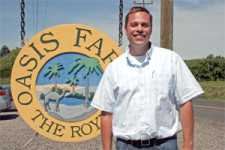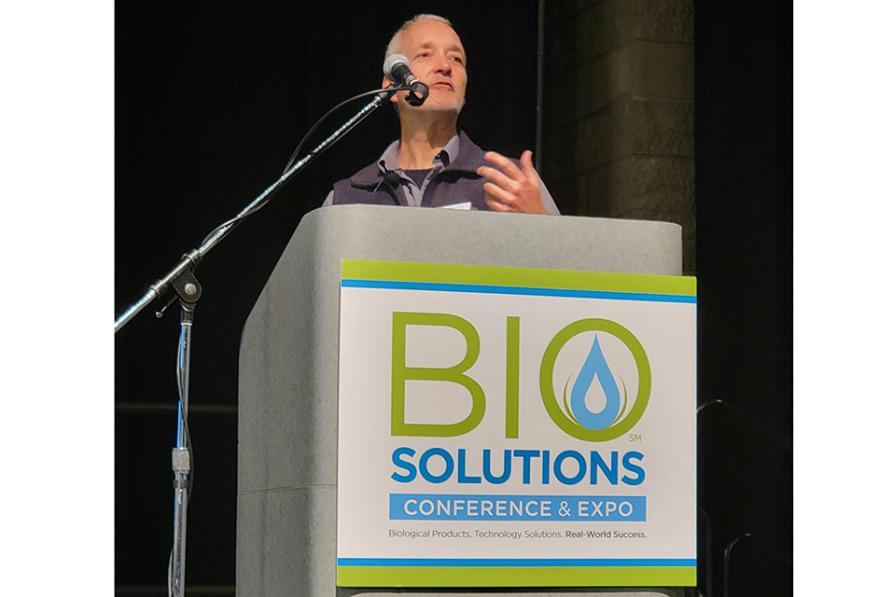Why Growers Should Get Involved In Their Industry

To say Brenton Roy is a joiner is clearly an understatement, but at the same time a mischaracterization. Roy, who farms winegrapes, apples, cherries, and berries along with some hops in Prosser, WA, gets involved in the grower associations that cover all the crops he farms.
He is currently chairman of the Association of Winegrape Growers of America, as well as a member of the Washington State Horticultural Association’s Board of Directors, the Washington Wine Commission, the ENZA North America Marketing Committee, and both the Hop Growers of Washington and the Hop Growers of America — and was past director of both hop groups. Oh, and he used to serve on the board of Wine Yakima Valley, the marketing organization for Yakima Valley winemakers and wineries, and was a past board member and chairman of the Washington Association of Wine Grape Growers.
Whew, that’s a lot for a guy who’s yet to turn 40. While he’s certainly service-oriented, don’t for a minute think it’s just about altruism. “I’ve given a lot, but I’ve received more in return,” he says. “I would have a lot less knowledge about each of these industries had I not sat on the boards.”
But all that volunteering must take up a lot of time. Where does he find the time to run his 1,500-acre operation, Oasis Farms? Quite simply, he makes time. “It’s well worth the investment to hire professionals to help run your company while you are out trying to shape the industry that you are working with,” he says. “There’s no question in my mind there is a return on these boards.”
Not For Everybody
While Roy clearly enjoys hobnobbing with the successful, progressive growers who make up these boards, he realizes it’s not for everybody. But lack of time should not be the motivating factor. “It’s a personal decision. If you don’t enjoy it, please don’t do it. You won’t get enough out of it if you don’t put something into it,” he says. “But if you can’t find the time to meet with an organization for a few hours a month six to ten times a year, then you may be understaffed at your company.”
In fact, Roy doesn’t consider his activism as taking away from the time he spends at his office, he believes it is in his job description. “Part of my job is to stay connected with the people who make the decisions on how the industry will change,” he says. “To operate a farm in the countryside, you have little interaction with not only the people who consume your product, but how it’s being sold,” he says. “One way to help shape the industry is to have some input on what happens after your product leaves your farm.”
You have to be able to keep a lot of plates in the air, says Roy, but anyone who farms such a wide range of crops is already something of a juggler. “I don’t want to come off sounding authoritarian, but at the end of the day, you have to do what you love. In joining these organizations, I’m following my passion,” he says. “For me, I’m good at juggling multiple production cultures and being involved in those industries and bringing that information back to our farm.”
Roy enjoys the wide diversity of the crops he grows in part because he enjoys the diversity of the growers who farm them. “That’s a big draw for me, and several of our managers have expressed the same sentiment. You get a little variety in your life. The winegrape industry is completely different than tree fruit because there is such a value-added component. Or you can partner with the winery you’re dealing with and really tell your story. The wine consumer is buying an experience, not just a product, as does an apple consumer,” he says. “Not that one’s better than the other, but they are different industries and they require different skill sets.”
A Solitary Man
Farmers are notoriously independent, and that’s certainly a quality to be respected, but Roy believes the solitary nature of the job makes networking a critical part of being a successful grower today. “The days of just producing a crop and not educating yourself about the industry are gone,” he says. “Farming is a lonely business, so you’ve got to make every effort to get out and listen to what other growers are doing.”
For Roy, the key question is the same one farmers everywhere are always asking. “What particular crop or what variety of a given crop should we be investing in today? In farming, you can’t afford to be wrong too often,” he says. “If you make five investments on new fields, four had better be right. They’re too capital intensive to make too many wrong choices.”
Roy believes anticipating change is the key to success in any business, farming especially, and being connected is the only way to do this. “I don’t know how else you’re going to do it,” he says. “Talk to as many people as possible. In one form or another, you have to reach out and try to better understand your work.”
For those growers who want to get more involved, Roy advises that they implement a management structure that allows the farm to function smoothly when they’re away. He can’t envision doing it any other way. “It’s a requirement of what I do; it’s what I think of as my job,” he says. “The structure is in place not so I can enjoy my free time. The structure is in place so I can do my job.”
But whatever you do, don’t force it; don’t pretend to be somebody you’re not, Roy concludes. “If you don’t love something, you’re not going to be good at it anyway,” he says. “This industry doesn’t need people just filling out resumes.”
Tasty Terroir
As chairman of the Winegrape Growers of America, Brenton Roy is keenly interested in terroir, and is therefore rightly proud of the Riesling grapes he grows for Chateau Ste. Michelle. Some of those grapes went into an Eroica Riesling that earned 95 points, three stars, and a “Top 10 Wines of 2008” designation from the Connoisseurs’ Guide: “Taking its accustomed place at the head of the class as it has in so many past vintages, this latest rendition from Chateau Ste. Michelle and Ernst Loosen is a remarkable wine of impeccable balance and stunning depth. Slightly sweet and buoyed by fine fruity acids, it smells of honeysuckle, white peaches, and minerals, and follows with long, compact, layered flavors that presently only hint at the richness to come. Top-notch Riesling is capable of great beauty and complexity with age, and we have no doubt that the greatness lurking here will gradually become more and more evident with time.”
Not bad for the great grandson of a migrant hop picker from Canada, eh?
Always Listening
When Brenton Roy says he learns an awful lot by picking the brains of farmers, he doesn’t mean they’re the only people to whom he listens. Sure, you can learn a lot from them, but you can also learn a lot right in your own backyard.
In his case, that would be his 60 employees, a figure that swells to 250 at harvest. After attending college, Roy knew he’d need to learn Spanish before he returned to the farm. “I like to be able to talk to the people who actually work the land,” he says.
After graduating from Gonzaga University, he spent time backpacking in Latin America. “It was great learning the language and the culture as well,” he says.
Another indication of his desire to seek out other points of view was the major he chose at Gonzaga, liberal studies. “I wanted to be a well-rounded person,” he says, before adding with a laugh: “But in hindsight it would have been nice to have taken some more ag and business courses.”
Making Lemonade
The Roys obviously are big believers in that old optimistic saying, “When life hands you lemons, make lemonade.” Back in the mid-90s Brenton Roy’s father had one field that wouldn’t lend itself to rill irrigation, so he really had no choice but to install a drip system. It was one of the first in the area, and worked out extremely well. Still, when Roy took over from his dad back in 1996, just 80 acres, maybe 10% of their acreage, was under drip. Today, Oasis Farms has truly lived up to its name, as 85% of its 1,500 acres is on drip. It’s a good example of how Roy pursues sustainability. “The things we do are all financially sustainable first and foremost,” he says. “Then we try and make it environmentally and socially sustainable.”
Another good example is their composting program. They use mostly waste from a nearby dairy that was struggling to deal with all the waste it generated. Roy says it’s an excellent addition to his sandy soils. “It’s not a quick fix, but we think that over the years we can build up the fertility, and we plan on being here a very long time,” he says. “Besides, dairy waste is a known quality; that’s a big factor with compost. We know where it came from and how it was made.”









